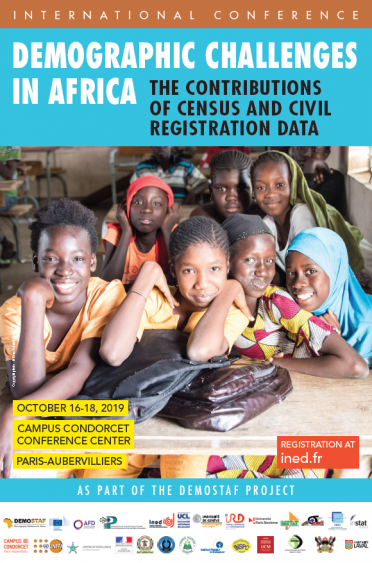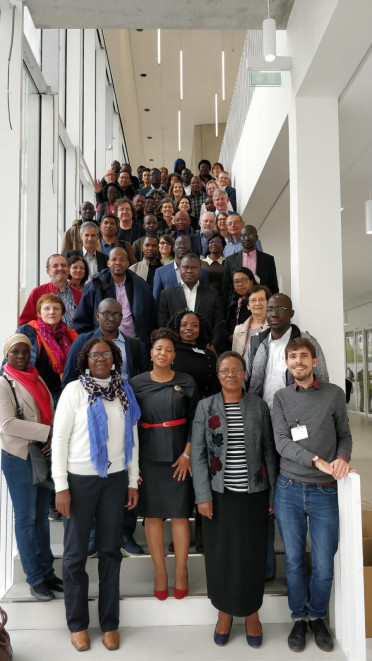International conference 2019
Paris-Aubervilliers, Campus Condorcet, 16-18 October 2019
Programme and Presentations
WEDNESDAY OCTOBER 16TH 2019
9:30-10:00 OPENING SESSION
• Magda Tomasini, INED
• Irina Dincu, IDRC, ESEC
• France Meslé, INED/IUSSP
• Mathias Kuepie, UNFPA
• Thomas Melonio, AFD
• Assa Doumbia Gakou, INSTAT Mali
10:00-11:45 CENSUS DATA QUALITY AND ESTIMATION
Chair: Madeleine Wayack Pambè (ISSP)
Discussant: Jean Pierre D. Bahoum (ANSD)
• Francis Gendreau (IRD), Le recensement de population en Afrique, une opération encore problématique
• Patrick Gerland (UNPD), Evaluation des recensements en Afrique : taux de couverture et qualité des données démographiques de base
• Bruno Lankoande (INED) et al., Estimating Mortality from Census Data: an record linkage study in the Nouna Demographic and Health Surveillance System in Burkina Faso
• Ian M. Timæus (LSHTM), Imputation of full birth histories from census data: a rediscovered method for detailed fertility analysis in sub-Saharan Africa
11:45-12:00 BREAK & POSTER SESSION
12:00-12:30 “FLASH SESSION” CENSUS DATA: ANALYSIS FOR INTERNATIONAL PERSPECTIVE
Chair: Abdramane B. Soura (ISSP)
• Soumaïla Ouedraogo (INED/Paris 1) et al. Mortalité des personnes âgées en Afrique subsaharienne : éclairage à partir d’estimations multi-sources
• Valérie Golaz (INED/LPED) et al. La non-scolarisation des enfants en Afrique: une analyse des effets de contexte
• Laure Moguérou (Univ Paris Nanterre /LPED) et al. Accéder au supérieur : un vecteur d’émancipation pour les femmes ?
•Marc Pilon (IRD) et al. Essai de mesure et d’analyse de la présence de domestiques dans les ménages en Afrique subsaharienne
• Claudine Sauvain-Dugerdil (UNIGE) et al. Configuration des ménages et qualité de vie au Mali et au Sénégal à travers les données de recensement
12:30-14:00 LUNCH & COFFEE BREAK
14:00-15:15 CENSUS DATA: COMPARABILITY
Chair: Sidy Boly (INSTAT Mali)
Discussant: Sara Randall (University College London)
• Aurélien Dasré (Univ Paris Nanterre/INED) et al., La comparabilité des données sur les ménages et les structures familiales dans les recensements du Burkina Faso, du Mali et du Sénégal
• Salut Muhidin (Macquarie University), The Use of Census Data for Understanding Cross-National of Internal Migration in Africa
• Lara Cleveland (IPUMS) et al., Improved harmonized census geography and spatio-temporal analysis in IPUMS: exploring population aging in Africa
15:15-15:45 BREAK & POSTER SESSION
15:45-17:15 THE 2020 CENSUS ROUND: OPPORTUNITIES OF GEOREFERENCED CENSUS DATA TO ADDRESS DEMOGRAPHIC CHALLENGES IN AFRICA
Moderator: Lara Cleveland (IPUMS)
• Mercy Kanyuka (Malawi National Statistical Office), Lessons Learnt from Malawi Census
• Erik Vickstrom (US Census Bureau), Computer-Assisted Personal Interviewing as a Census Data Processing Solution in Africa: Observed Opportunities and Challenges
• Mathias Kuepie and Sabrina Juran (UNFPA) Challenges in Modernization of Census and the Geography of Inequalities
• Allan G. Hill and Winfred Dotsi-Gborgbortsi (Univ of Southampton), Explaining the Spatial Patterning of Health and Mortality in African Cities by Augmenting Census Data: The Ghana Case
THURSDAY OCTOBER 17TH 2019
9:30-10:00 “FLASH SESSION” CENSUS DATA: ATLAS AND TERRITORIAL DYNAMICS
Chair: Clémentine Rossier (Univ Genève)
• Jean-Pierre D. Bahoum (ANSD) et al., Cartographie des familles : Atlas communal des familles au Sénégal
• Baguinébié Bazongo (INSD) et al., Atlas sociodémographique des ménages du Burkina Faso
• Abdourahmane M. Sene (Univ A.S. de Ziguinchor), Enjeux socio-économiques et territoriaux de la dynamique démographique au Sénégal
• Richard Marcoux (Univ laval) et al., Présentation de l’atlas interactif sur l’éducation (Burkina Faso, Mali, Sénégal)
10:00-11:45 UNDERSTANDING SOCIODEMOGRAPHIC TRENDS USING MULTIPLE SOURCES
Chair: Serge Rabier (AFD)
Discussant: Bilampoa Gnoumou Thiombiano (ISSP)
• Bruno Schoumaker (UCLouvain), Stalls in Fertility transitions in sub-Saharan Africa. Revisiting the evidence.
• Moussa Bougma (ISSP) et al., Définition et mesure de l’(an)alphabétisme : approche critique appliquée à cinq pays (Burkina Faso, Madagascar, Mali, Ouganda et Sénégal)
• Roch M. Millogo (Univ Genève) et Clémentine Rossier (Univ Genève/INED), Transition de la fécondité à Dakar, Ouagadougou et Nairobi: une baisse identique à tous les âges, soutenue par un espacement de plus en plus en long ?
• Rila Ratovoson (INED/Paris 8/IPM) et al., La transition sanitaire malgache dans les villes et en milieu rural : une analyse croisée des données d’enquêtes, d’état civil et de suivi démographique
11:45-12:00 BREAK & POSTER SESSION
12:00-12:30 FLASH SESSION CENSUS DATA: SPATIAL ANALYSIS
Chair: Gilles Pison (Museum, Ined)
• Christian Kakuba (Makerere Univ) et al., Who leaves school prematurely in Uganda; do predictors vary by place of residence?
• Hervé Bassinga (ISSP/INSD), Inégalités géographiques de mortalité infanto-juvénile au Burkina Faso : une analyse des recensements de 1996 et 2006
• Arlette Simo Fotso (IRD) et al., Le handicap chez les adultes (18-59 ans) au Sénégal : une approche écologique
• Roch M. Millogo (Univ de Genève) et al., « Basse » fécondité au Sénégal : un phénomène de diffusion dans un contexte de transition démographique?
12:30-14:00 LUNCH & COFFEE BREAK
14:00-15:45 CIVIL REGISTRATION AND VITAL STATISTICS 1: DETERMINANTS
Chair: Neo C. Sebolao (Botswana Civil Registry)
Discussant: Michel Guillot (INED)
• Kudzaishe Mangombe (Univ of Zimbabwe) et al., Predictors of birth certificate possession among children aged 0-17 years in Zimbabwe: An analysis based on the 2012 Population Census
• Patrick Nshimiyimana (National Institute of Statistics of Rwanda), Study on knowledge, attitude and practices of parents towards birth registration in Rwanda
• Atoumane Fall (ANSD/UCLouvain), La déclaration des décès à l’état civil à Dakar : une exploration des facteurs explicatifs à l’aide des données de recensement video
• Louis Niamba (CRDI) et Irina Dincu (CRDI), Enregistrement des naissances et des décès à l’état civil dans l’observatoire de population de Nouna, Burkina Faso : États des lieux, obstacles et perspectives
15:45-16:15 BREAK & POSTER SESSION
Mireille Davienne, Birth registration improvement in Burkina Faso over the last years and current challenges. The contribution of the BRAVO! Program video
16:15-17:30 CIVIL REGISTRATION AND VITAL STATISTICS 2: COVERAGE
Chair: Irina Dincu (CRDI)
Discussant: Patrick Gerland, UNPD
• Nadia Touihri (INS, Tunisie), Recent Advances and Current Challenges in Vital Statistics Production from Incomplete Civil Registration data in Tunisia
• Neo C. Sebolao (University of Botswana), Botswana success story of completeness of civil registration system ? a case study
FRIDAY OCTOBER 18TH 2019
9:30-11:15 DISSEMINATION OF AFRICAN DEMOGRAPHIC DATA AND LESSONS FROM DEMOSTAF FOR A COLLABORATIVE RESEARCH WITH NSOS
Chair: Christian Kakuba (Makerere University)
Discussant: Bazongo Baguinébié (INSD)
• Françoise Gubry, Dominique Diguet (INED) et al., Données d’enquêtes démographiques africaines : des accès plus performants
• Richard Marcoux (Univ laval) et Cécile Compaoré Zoungrana (UNFPA), Enjeux du partage et de l’accessibilité des données pour des fins de recherche en Afrique
• Madeleine Wayack Pambè (ISSP) et Géraldine Duthé (INED), Retour d’expérience du partenariat DEMOSTAF
• Claudine Sauvain-Dugerdil (Univ de Genève) et al., L’éthique en pratique
11:15-11:30 BREAK 11:30-12:00 THE POTENTIAL OF SATELLITE DATA
Chair: Arsène Ravelo (INSTAT)
• Valérie Golaz (INED/LPED) et Olivier Queyrut (CNES), Croissance démographique et déforestation en Ouganda : les enseignements d’une analyse conjointe des données de recensement et des images satellites
12:00-13:00 ROUND TABLE “AFRICAN NATIONAL STATISTICS FOR MEASURING AND UNDERSTANDING DEMOGRAPHIC CHALLENGES: OBSTACLES AND OPPORTUNITIES”
Chair: Jean-Alain Goudiaby (Univ. A.S. de Ziguinchor)
• Assa Doumbia Gakou (INSTAT Mali)
• Abdourahmane M. Sene, Directeur national de l’aménagement du territoire du Sénégal
• Irina Dincu (IDRC, ESEC) • Serge Rabier (AFD)
13:00-13:15 CONCLUDING REMARKS
• Mathias Kuepie (UNFPA)
• Géraldine Duthé (INED)
Videos - Presentations on Civil Registration
CIVIL REGISTRATION AND VITAL STATISTICS 1: DETERMINANTS
CIVIL REGISTRATION AND VITAL STATISTICS 2: COVERAGE
FLASH SESSION
Audio - Round Table Discussion
Round table on the obstacles and opportunities of official statistics to meet demographic challenges
Description
The special emphasis placed in the SDGs on inequality and ensuring inclusive developmental progress calls for the production of indicators at the most narrowly defined geographical and socio-economic level. This need demands stronger interaction between government statisticians and researchers. For example, census data, although spaced out over time, provide demographic and socio-economic information at the individual and household levels across a country’s entire population. Census data enable the production of indicators at highly disaggregated levels, as well as mapping, environmental, and multilevel analyses. Meanwhile, the systematic recording of vital events in civil registration systems is still rare on the continent. However, longstanding and efficient systems are in place at the local level. Efforts are also being made to improve record-keeping by introducing collection systems and methods more relevant in their contexts (mobile phone usage, determination of probable causes of death through family surveys, etc.).
Submissions up to April 15th 2019
- Background information
- Objective
- Data and Methods
- Results (preliminary)
- Conclusion or contribution (preliminary)
Conference structure and schedule
Scientific committee
Partners




